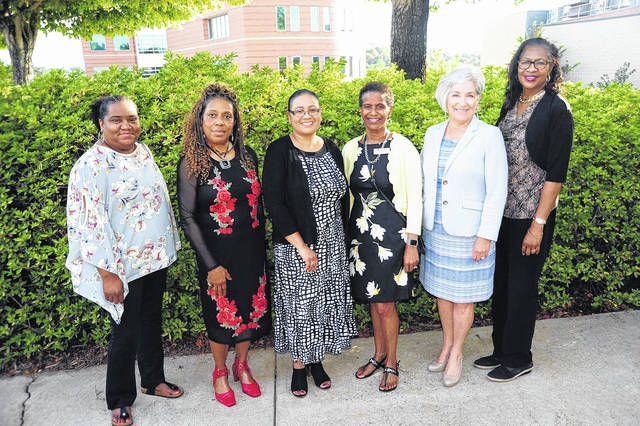
Committee Chair Karen Carter, executive director of Clemson Community Care, fifth from left, is pictured with committee members Shannon Cobb, human resources director for the Foothills Area YMCA; Dr. Sandra Sloan, South Carolina Vocational Counselor; Croslena Broadwater-Johnson, director of student support at TCTC; Emma Robinson, coordinator of student resource programs at TCTC; and Cathy Stowers, office manager, SHARE.
Courtesy of TCTC
PICKENS COUNTY — The Community Partnership Advisory Committee (C-PAC) was named Tri-County Technical College’s advisory committee of the year for the positive impact it has on students by providing essential resources and support to those facing hardships that could hinder their academic goals.
The committee was recognized for its achievements this year at the College’s fall convocation August 19.
Committee Chair Karen Carter, executive director of Clemson Community Care, and committee members accepted the award.
C-PAC advisory committee was established in January 2018. The community agencies that comprise C-PAC are: Clemson Community Care, AIM, SC Vocational Rehabilitation, Littlejohn Community Center, Ripple of One, SHARE, Foothills YMCA and United Way of Pickens County. Additionally, four TCTC representatives assist from various departments across campus.
C-PAC was created to strengthen the awareness of community resources available to students who are experiencing challenges and to shorten the time-frame needed to connect students to these resources, said Emma Robinson, coordinator of student resource programs at TCTC.
“The knowledge and expertise of community agencies, in conjunction with close working relationships between those agencies and College personnel, are vital in aiding and expediting resources to TCTC students quickly to minimize the negative impact to the student’s success,” said Robinson.
“The agencies that are a part of the committee represent food pantry and financial help, child care resources, scholarship opportunities, and financial planning programs. We feel that together we can offer assistance and support to students, relieve some stress and help them into stability with their situations,” said Carter.
“I feel very strongly that this committee provides a valuable service to the college and its students. I feel like the time I spend as a part of it is time well spent for our agency. We will benefit as a community from having stable, sustainable situations for our individuals and families and I am grateful to have been offered the chance to work with those at Tri-County Technical College and other agencies to provide those opportunities,” said Carter.
For example, Robinson said a student submitted documentation to Wellness Programs indicating an urgent need for rental assistance due to an unexpected medical emergency. TCTC’s Wellness Programs sent a referral to C-PAC for assistance. The C-PAC responded immediately by providing the rental assistance needed which prevented a student withdrawal.
To date C-PAC has assisted more than 50 students to overcoming barriers that could have derailed their academic goals, Robinson said. Another example is when C-PAC worked with a homeless student to obtain stable housing with Habitat for Humanity in Pickens County.
Most recently, C-PAC played a major role during the COVID-19 crisis by providing emergency assistance for students quickly and efficiently, said Robinson. “Our team appreciates the opportunity to collaborate with community agencies, while contributing to Tri-County Technical College’s mission to provide communities with highly-skilled and well-trained graduates for continued economic growth and sustainability in the three-county service area. Although there is a tremendous amount of work that goes into identifying, accessing, and delivering services to students, it is an honor for Wellness Programs to assist students in overcoming barriers to reach their personal, academic and career goals, said Robinson.
“The Community Partnership Advisory Committee, who works closely with Student Support at the College, has been absolutely pivotal in the success of the I-BEST students for several years now, but especially within the last year when COVID-19 caused students to transition to remote learning, whether they had the skillset or not,” said Tiffany Rogers, student services program coordinator for I-BEST.
“Many students at Tri-County went home where there was no internet, bills to pay, and many lost their employment. These students were in desperate need of basic life resources and several would have withdrawn from college altogether if not for the intervention of Student Support. During the last year, they assisted many of our students by arranging for them to have wi-fi hot spots at their homes to successfully complete coursework,” said Rogers.
Student Development and Wellness has been one of the most important factors in the success of many of TCTC’s Engineering and Industrial Technology (EIT) Division students, said Brittany Talbert, academic resource specialist for the division.
“For students who are facing hardships, temporary or otherwise, they are an even greater resource. They partner with outside agencies in the community to make sure that students with financial hardships have somewhere to go if they cannot afford rent, utilities, transportation, or childcare. I also sent students to Emma Robinson for help with counseling resources, funds for textbooks and meal plans, and even to get a wi-fi hotspot for online classes,” said Talbert.
“When a student is facing non-academic hardships, it trickles into their academic life as well,” said Talbert. “The Wellness team’s ability to help students navigate these tough times has helped them more than just in a gradebook. We are so appreciative that we can send our students to the Student Development and Wellness office and know that they will be in good hands.”

